Your life is a living hell.
No matter what you do, no matter where you go, there’s the unshakeable feeling within you that you’re pathetic, worthless, ugly, stupid, and a total failure at everything.
You may achieve something, and you may be given love and affection, but you brush it off because of the toxic shame filled self-loathing voice within you that whispers:

Soul Work Compass Course:
Feeling lost, stuck, and trapped in repetitive cycles of pain? Discover your Soul's Compass to reclaim your purpose and find your path to freedom.
⭐️⭐️⭐️⭐️⭐️ "I am finding out so much about myself and having so many realisations about my life ... I already know it is what I’ve needed for so long." – Jen N.
Who do you think you are? You’re no one. You’re not good enough. You’ll never be good enough. Stop fooling yourself, you f*cking idiot.
Can you relate to this incessant feeling of self-loathing and self-hatred?
Do you feel like, no matter what you do, you’re unimportant, inferior, unwanted, broken, hopeless, useless, ridiculous, and unlovable?
I have been there before.
In fact, my self-hatred at one point was so intense that I resorted to self-harm in order to cope with it. For many years, I was trapped in the prison of my mind, and it was a horrific experience – something that many people cannot even begin to understand.
The truth is that there’s no quick, one-size-fits-all solution for self-loathing. But there are many ways to overcome it. And the fact that you’re here is already one step in the right direction toward self-love and self-compassion.
Table of contents
Self-Loathing Definition
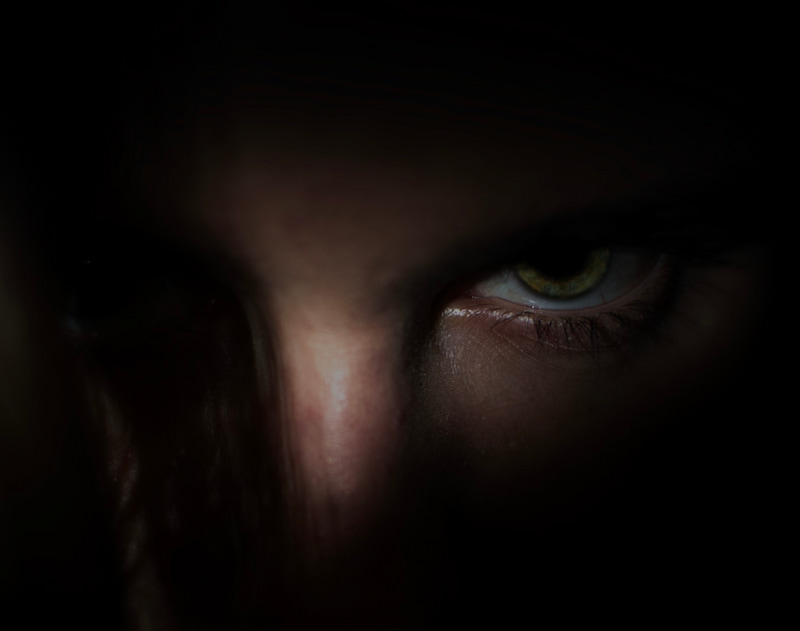
Self-loathing is synonymous with self-hatred: it’s an extreme dislike of oneself. It’s fuelled by anger, low self-esteem, and a distorted perception of oneself due to misguided thoughts and toxic self-beliefs. In most cases, self-loathing is the result of having a dysfunctional upbringing.
Hating Yourself: 3 Reasons Why It Happens

Hating yourself sucks. And it’s more complex than it looks on the surface.
In order to overcome your self-loathing, you need to understand why it happens and where it came from.
Want to get LonerWolf at the top of your Google search results?
There are three main factors at the root of hating yourself:
- Poor family environment
- Poor social environment
- Ego possession and soul loss
1. Poor family environment
Firstly, there is the poor family environment. When we’re raised in a family that is either (a) too smothering and possessive or (b) too neglectful and rejecting of us – or in some cases, both combined – we internalize the idea that there’s something defective or wrong with us. Why else would our parents or family members behave in that way? Why else would they harm us? Mommy and Daddy are meant to love us, right?
You see, as young children, we needed to see our parents in an almost godlike way. To us, they needed to be right, safe, and infallible because if we mistrusted them, it would have been very hard for us to survive (emotionally, mentally, and in some cases physically).
Therefore, instead of critically analyzing and condemning our parents (which young children don’t have the cognitive capacity to do), we turned the blame onto ourselves. We felt there was something wrong with us. We felt that we were wrong, bad, and shameful for the way our parents and family members treated us. We took the blame for something they did wrong.
Thus, we have one major cause of self-loathing: it’s based on the misguided core belief that we adopted as children that there’s something fundamentally wrong with us.
As psychoanalyst and philosopher Alice Miller writes:
The love a child has for his or her parents ensures that their conscious or unconscious acts of mental cruelty will go undetected.
Author and therapist Anodea Judith goes on to explain:
Since we usually identify with our caretakers and their values, the way they treat us teaches us about our value as human beings. We take on their attitudes toward us. Abuse makes us feel unlovable, and feeling defective only adds to our shame. Unlovable, we are no longer in touch with our divinity, our specialness, our validity as human beings. Convinced that the fault lies in some intrinsic flaw, to which we are blind and helpless, we abandon ourselves.
2. Poor social environment
Building on top of a poor family environment is a poor social environment. And you don’t have to look very deep into society before you come across some really nasty shit.
Other than the typical cases of bullying we see in schools, our childhood social environments that were outside of the house may have reinforced our self-loathing even more through the harmful effects of social media conditioning and the obsessive toxic comparison with others.
If you were alive before the rise of social media and internet usage, you might have come across critical and shame-driven teachers or education systems that made you feel worthless or inferior if you didn’t meet their standards of success.
Would you like to save this?
Your information will never be shared.
Any experience or environment that reinforced the false idea that “there’s something wrong with you” likely deepened the amount of self-loathing you held. And if you’ve ever read into basic psychology, you’ll know that the mind likes patterns, so you’ll eventually find yourself in a bubble full of confirmation bias where you’re constantly looking out for and receiving validation that you’re worthless. This pattern occurs because it appeases the mind’s need to control and understand life.
(It’s the exact same bubble algorithm that social media networks like Facebook use – except self-loathing plays with your entire life, on-screen and off-screen.)
3. Ego possession and soul loss
Finally, we come to the core issue at the heart of all self-loathing: soul loss. This term may cause you to roll your eyes or feel confused – but hear me out.
We are all born with no sense of “me,” “my,” and “I.” As babies, we are ego-less and at One with the Universe. But as we grow older, in order to survive in this world, we need to separate ourselves to build a sense of self. To construct an ego.
This basic separation from the Universe, from the Divine, is at the root of all self-loathing. We can only hate ourselves when there is someone to hate. Without that someone, without that ego, there is no self-loathing and, therefore, no suffering. (By the way, this state of egolessness has been referred to as heaven, Self-realization, Nirvana, illumination, enlightenment, and so on for thousands of years.)
Soul loss occurs when we get so enmeshed and immersed in our fabricated egos that we feel totally disconnected from anything good, meaningful, or real. Instead, we feel empty, lost, hopeless, and in many cases, full of self-loathing.
The good news is that you can experience this for yourself – you don’t have to believe one iota of what I’m saying. The gateway to experiencing the reality that your sense of “you” is not real is through meditation.
If you’d like to take a tentative step in this direction, I recommend practicing mindfulness meditation and downloading a free app like InsightTimer (which is what I use). There are thousands of free meditations on this app, and to help narrow your focus, you might like to start with the self-compassion or self-observation meditations that are available.
Later in this article, I’ll explore how to prevent your ego from possessing you. But in the meantime, you might like to open in a new tab or browser window the following articles to read later:
15 Signs You’re Struggling With Self-Loathing

How can it be “happy hour” if I spend the entire time crying tears of self-loathing & despair into my $1.50 beer?
– Unknown
Are you struggling with self-loathing? Pay attention to these signs – some of them are surprising and lesser-known than the others:
- Extremely harsh self-talk (“I’m stupid,” “I’m worthless,” etc.).
- Depression and anxiety.
- Feeling chronically insecure around others.
- Slouched or poor posture.
- Neglecting your body and health.
- Self-sabotage and self-destructive behavior (aka., not allowing yourself to be happy).
- Anger issues.
- Refusing compliments, advice, or help.
- Self-isolation.
- Addictions or addictive tendencies.
- Having a martyr complex.
- Feeling like a victim all the time.
- Defeatist mindsets like “What’s the point,” “I can’t do this,” and “This is hopeless.”
- Hopelessness.
- Aimlessness.
All of these behaviors and tendencies inevitably result in, and are caused by, self-loathing.
Self-Loathing, Spiritual Awakening, and the Dark Night of the Soul

Sometimes, experiencing self-loathing is a sign that you’re going through a Dark Night of the Soul, which is essentially the shadow side of the spiritual awakening process, a typically uncomfortable but expansive journey of transformation.
When we undergo a Dark Night of the Soul, we feel abandoned by God or Spirit, we carry an inner feeling of emptiness and aloneness, and we have the sense that we’re totally cut off from the Divine.
The Dark Night is also accompanied by existential questions such as “What is the meaning of my life?” “Why do good people suffer?“ and “Who am I?”
It’s common to do a lot of Soul searching during the Dark Night and to feel disconnected from our True Nature, our place in the world, and our life purpose. The result is often a feeling of existential depression and feeling alone and isolated from everyone and everything.
If your self-loathing seems to have a deeper dimension to it beyond just a self-worth issue, you might like to learn more about the Dark Night of the Soul.
7 Ways to Overcome Self-Loathing and Stop Hating Yourself
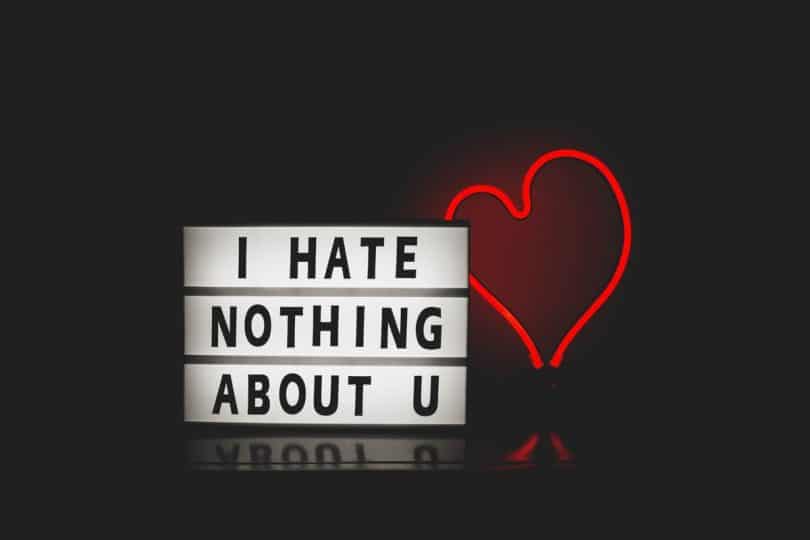
How has it come about that we are so bewitched by our self-hatred, so impressed and credulous in the face of our self-criticism, as unimaginative as it usually is? … Self-criticism, when it isn’t useful in the way any self-correcting approach can be, is self-hypnosis. It is judgement as spell, or curse, not as conversation; it is an order, not a negotiation; it is dogma, not overinterpretation.
– Adam Phillips
By now, a sense of frustration, desperation, or grief may be welling up inside of you.
Not only do you feel tormented by your self-loathing, but you also feel victimized by it as well.
Well, the truth is that you are being victimized by your self-hatred. But you don’t have to stay a victim forever.
You’ve already taken the first step in the direction of health and well-being without even knowing it. (Well done, by the way.) Next, it’s time to step out of the role of victim and into the role of warrior.
Here are some powerful ways of overcoming self-loathing.:
1. Get the hell off social media

You heard me. Take a break, or detox, from social media – and set your goal for 30 days. If that seems too long, try one week with no social media. I’m talking no Facebook, no Instagram, no TikTok, and no YouTube – none of it!
If you have to uninstall a hoard of apps, do it. If you have to shove your laptop under the bed in a locked vault, do it. Go hermit mode. Say sayōnara to the constant notification dings and stream of other people’s mental vomit. You’ll be happy you made this choice!
The reason why I advise you to get the hell off social media is that it tends to reinforce self-loathing through a phenomenon known as toxic comparison.
When we go on social media, we see a finely curated version of other people’s lives. We see what others want us to see, not what is actually going on under the surface. And we then compare our lives to those picture-perfect versions of other people’s realities. As a result, we start to get anxious, depressed, and full of self-loathing. Doesn’t that suck?
“Why can’t I be that slim/ripped?” we may lament as we scroll through endless pictures of chiseled bodies in bizarre yoga poses. “Their house/boyfriend/wife/holidays/life is so amazing, and mine … sucks.”
Can you see where all this leads? Yes, we begin to feel horrible about ourselves and our lives.
So please distance yourself from social media. It should be classified as a Class A Substance because of its addictive potential and negative side effects.
By the way, according to many studies, people who take a break from social media report feeling happier, more relaxed, and more productive. So take comfort in that and use this information to motivate you to turn off and tune out.
2. Do one kind thing for yourself every day
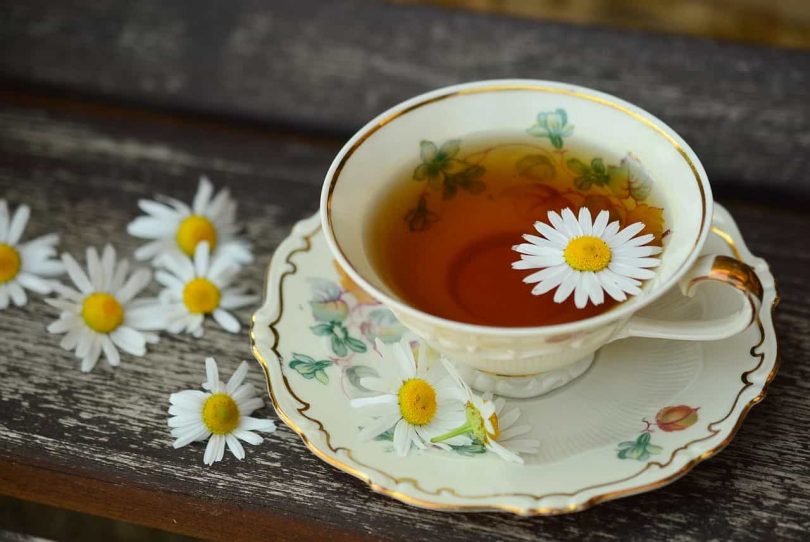
It doesn’t matter what that one nice action is, do something, anything that is well-intentioned toward yourself.
For example, this one kind of action may involve putting on an extra jacket when you feel cold, making yourself a healthy breakfast, going to bed early, taking a walk in nature, or having a warm bubble bath. Just make sure that you’re consciously doing it with the right intention, which is to show kindness toward yourself.
Doing one good thing for yourself every day can feel weird at first. If it does, take a minute to note down those feelings and responses in a journal.
In fact, if you’re stuck for ideas, I recommend journaling every day. If you don’t know how to approach journaling, see my How to Start Journaling article.
You may also like to get our guided Self-Love Journal which can be tremendously supportive on your journey to recovering from self-loathing.
3. Creatively express your self-loathing

Art is a powerful healing practice that will help you come to terms with how self-loathing is influencing you.
One powerful art practice is to get a big sheet of blank paper and a few colored pens and draw yourself as the self-loathing part of you perceives you. Then, get another piece of paper and draw yourself as a genuinely loving and compassionate person would see you.
Compare the two drawings. How do they make you feel? What memories or thoughts arise? You may like to write these down on the back of each drawing.
If you get a lot out of this practice, you might like to look into the field of art therapy more in-depth. (See this article on art therapy for more guidance.)
4. Explore the question, “Does my environment support me?”

In other words, do your friends support you? Do your colleagues support you? Does your work, family, or study environment support you?
When I write “support you,” what I really mean is, do these people and environments uphold and uplift you?
If you feel loved and accepted exactly the way you are, you are in a supportive environment.
If, on the other hand, you’re surrounded by people who belittle, condemn, or frequently reject you, you’re in an environment that reinforces self-loathing. Such a situation is toxic, and in the interest of your health and happiness, I strongly advise you to do some heavy-duty “spring cleaning” and remove these people from your life if possible – or distance yourself as much as possible.
It can feel scary to change friends, jobs, and habits. It can feel daunting to stand up and make a change – despite what the harsh and critical voice in your head says. But you have a warrior inside of you, and you have the right to be happy and to live a life that supports you.
So do some thinking. Assess your life right now. Plan escape routes. Seek out those who uphold and uplift you. It may take some time, but it is so worth doing. Neglecting this practice is like trying to build a castle on top of a swamp: it’s unstable. Any changes you make will be undermined by those around you if you aren’t careful. So choose your company wisely.
5. Explore your core beliefs (and reframe them)
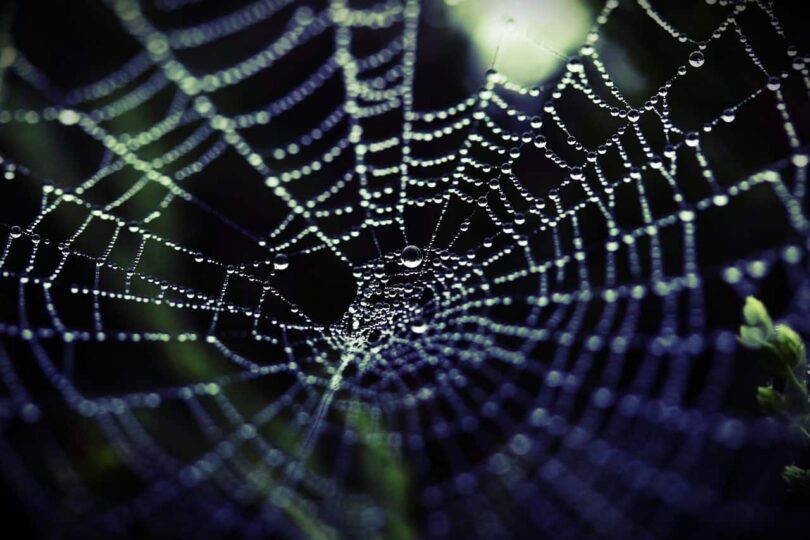
Your core beliefs are the central convictions or strongly held ideas that you have about yourself. Everything else in your life – your habits, behaviors, self-talk, job choices, friends, partners – will revolve around these central beliefs. And if these beliefs are negative, beware! So much pain and suffering in life stems from our toxic core beliefs.
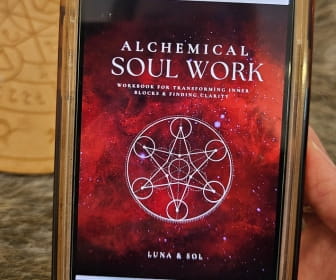
Struggling with inner blockages?
Learn how to transform your confusion into clarity. With 50+ deep dive prompts, your journey of self-discovery awaits in our Alchemical Soul Work Workbook.
Common negative core beliefs include:
- “I am bad.”
- “I am worthless.”
- “I am unlovable.”
- “I am defective.”
In my article on core beliefs (which I strongly encourage you to read), I show you how to get to the root of these central convictions and uncover your core beliefs.
Once you have found your core belief, it’s then essential to reframe and reprogram it. So, for example, if your core belief is “I am unlovable,” then you would hold as your mantra something like “I am lovable,” or “I am worthy of love.”
This affirmation can be repeated endlessly throughout the day whenever a thought or feeling of self-loathing arises. Slowly, you will shift your core belief from being toxic and negative to being healthy and positive.
6. Commit to self-love and self-care

Self-love and self-care are commitments and attitudes we bring into our lives. When we walk the path of self-love, we are taking every opportunity we can to take care of ourselves – no matter what happens or who happens to hurt us.
What’s the difference between self-love and self-care, you may wonder? Well, self-love is more directed toward the heart and mind. Self-care, on the other hand, is more body-oriented.
Ultimately, the goal is to take care of all levels of your being (your body, heart, mind, and soul). That’s why I recommend you read our articles on how to love yourself and how to practice self-care as key places to start.
7. Take care of your soul (mindfulness + meditation)
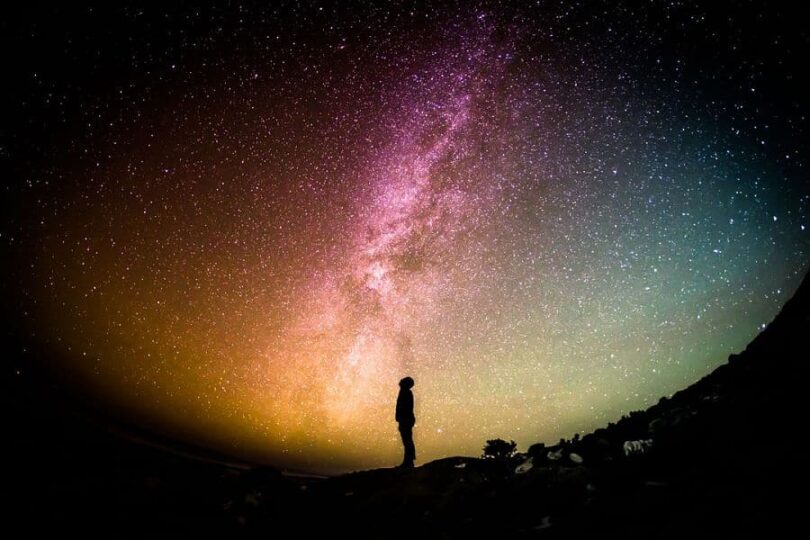
As I mentioned above, soul loss is at the very root of self-loathing. When we are disconnected from the Divine – in whatever form that is to us – we feel empty, dead, and lost inside.
The easiest way to re-establish a connection with your soul is through mindfulness and meditation.
Mindfulness reconnects you with the present moment, which is where all the magic happens, and meditation helps you to move past your ego and experience your soul.
Mindfulness and meditation also help you to deal with self-loathing thoughts by becoming aware of them. Once you become aware of these self-hating thoughts, you become an observer of them rather than being lost in them. It’s kind of like the difference between being in a dramatic movie versus sitting back in the movie theater and watching the movie in a relaxed manner.
If you don’t meditate already, I encourage you to download an app like InsightTimer, Headspace, or Calm. There are thousands of free meditations on these apps, and I guarantee that you’ll find something that resonates with you after browsing for a couple of minutes.
One of the greatest discoveries I’ve made is that mindfulness and meditation can be practiced anytime, anywhere, and with anything. The beauty is that it can become a way of life, a constant doorway to freedom from suffering. And that is the true beauty of practices such as these.
Hating Yourself is Based on a Simple Misunderstanding

In conclusion, I want to highlight the simple truth that hating yourself is based on a fundamental misunderstanding about your worth.
At the root of self-loathing is the belief that there’s something intrinsically wrong, bad, or defective about you. But that isn’t so.
You are worthy of love. You are worthy of being seen. You are worthy of being held.
You are a child of the Universe, and you are here for a reason.
Who has the right to say otherwise? (Answer: No one.)
The only way you can truly understand this for yourself is to start your own spiritual journey – to be the rebel, the lone wolf that revolts against your thoughts and the ego that likes to make you feel worthless.
It is your birthright to pave your own path, blaze your own trail in life, and refuse to be tamed by your conditioning.
It’s time to step up and reclaim your self-sovereignty.
Will you accept the call?
***
What does self-loathing feel like to you? If you’ve managed to overcome it, what helped? Please share below!
Two paths to inner transformation – here’s how I can help you go deeper:
1. The Soul Work Compass Course: Feeling lost or stuck in repetitive cycles of pain? The Soul Work Compass Course is your guide to reclaiming your true purpose. In this deep yet practical journey, you’ll learn how to heal core wounds and create a tangible "Soul's Compass" to navigate life with clarity. Enroll now and find your True North!
2. The Inner Work Journal Bundle: Ready for deep transformation? This bundle includes three powerful journals – Self-Love, Inner Child, and Shadow Work – with 150+ prompts to heal wounds, integrate your darkness, and experience bone-deep change. Digital & printable. Print unlimited times.

 $3
$3
People often experience self loathing because they are Out of alignmebt with their true self which they haven’t yet discovered and because they do Not live Up to their Potential. I hate myself because i am Not jacked for example. The reason is Not that i have unhealthy Ideals but that i do Not Work to embody them.
This may seem a bit off the wall, but…. So many (all?) of your photos of adults (as opposed to children), are beautiful and young. When I, as a 68 year old woman who definitely looks older than 60 (LOL), see these photos in a piece on, say, self-loathing, I’m like, “Really? You look like a young goddess, and you hate yourself?”
Well I’m sure many people do hate themselves, regardless of what they look like and at whatever age. But I hope you’ll consider being more inclusive and diverse in your images of adults, especially women. I think it would (at least subconsciously) help more readers of all stripes feel like they’re included in your target audience. Even at 68, I’m still working through all kinds of cr*p, and overall I find your site to be an incredible resource whenever I need comfort or some new ideas. And so many of the images here are beautiful, interesting and inspiring! Please include even just a few older and/or more ordinary-looking adults among them. Even many of us older folks are spiritual wanderers, still trying to find our way ☺️ Thanks for considering it.
Reading this feels like a physical weight on my chest. I’ve heard that weight is actually called heartbreak, but that’s something I’ve only seen in a romantic-relationship connotation. I struggle with literally being incapable of fitting in with society. I don’t keep friends unless they’re part of my daily routine. How often do you peoples feel like you’re separated from other people? I’m in a safer home/household than I once was. I’m lucky that I don’t have every type of toxicity to work through.
It sucks you’re going through that Someone. I feel one important thing to keep in mind is that many ‘inabilities’ we attribute to ourselves and our own limitations are partially societal problems.
I’ve seen many people share your experience struggling to keep friends but a lot of it has to do with a lack of enough institutions that can serve as bridges to create common ground. That’s why many people are just finding connections through their ‘daily routine’ but there’s not enough common ground there, especially with the internet which has exposed us to interests we may have that don’t have many people locally who share them.
I hope it helps you know that you’re not alone.
This is very relatable to me, I’m very busy and have to work to maintain my life so I can empathize with your position a lot. I’m not sure what the solution is but I know we are capable of finding one that suits what is needed.
I’ve been on a really weird path as of late. I’ve been working through a lot of issues from my childhood that have greatly impacted my life. As I have worked through them I realized the worst of all these issues is my own self hatred. No one can hate me more than I hate myself. I hate me because I am me. But I’m going to work to get through this and it starts with the items in your article. I know it will take time, but it starts with this and reframing my core beliefs.
Thank you for your work. It helps.